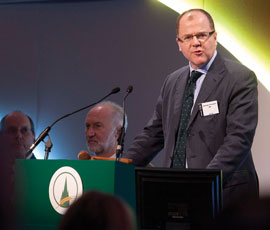Oxford Farming Conference: Technology revolution presents opportunities for farming

A technological revolution in British agriculture presents huge opportunities for UK farming, according to Tory MP George Freeman.
Mr Freeman was speaking at the Oxford Farming Conference on the potential impact of the government’s £160m agri-tech strategy.
Mr Freeman, the Tory MP for mid-Norfolk, said that the pace of economic development in industrialising countries was “utterly breathtaking” and would lead to more pressures, but also opportunities, which the strategy could make use of.
The future of agriculture according to George Freeman
- No CAP – either Pillar 1 or 2.
- Three distinctive types of farming – large intensive, small specialized, and landscape managers.
- Routine work replaced by robotics/automation
- Everything measured in the supply chain
- More precision farming
- End of cheap food – today’s food prices will probably be viewed as a post-war phenomena
- In the UK, land, labour, and inputs costs will continue to spiral
- Farm labourers will have PhDs and higher salaries
- The cost of land will mean more “out of soil growing”, e.g. hydroponics
- Every farm will be a mini-power station
- Pharma and agri-foods will converge
- NHS to prescribe health diets
“We need to go out to the oil rich countries of the world and knock on their doors,” to export UK agricultural products and British knowledge, technology and agriculture leadership, said Mr Freeman.
Also of key importance was the need for the agri-tech strategy to move on from the “stale debate” which saw economically viable farming and environmental sustainability at odds with each other, he said.
An ambitious, skilled, and entrepreneurial next generation of new entrants were vital to realising the vision of dynamic modern farming and a new public ad political discourse, Mr Freeman added.
However, he warned the agricultural industry needed to be honest and candid about why it had failed to win the public over on technological innovation and needed to excite the public about agriculture. Politicians should not get involved in the discussion on GM but should instead focus on the benefits of technology in general, Mr Freeman said.
The Agri-Tech Strategy
Launched last July the agri-tech strategy remit said it would turn the UK into a world leader in agricultural science. The strategy includes four agri-science research and innovation campuses set up by the Biotechnology and Biological Sciences Research Council, a scientific research partnership between Rothamsted and Syngenta, and a new leadership council.
The strategy will comprise of the catalyst fund (£70m) and agricultural “innovation hubs” (£90m). The fund will support early stage research, which promotes innovation and translates science and technology into the field. The innovation hubs will form clusters of research organisations where knowledge and skills could be shared. A further £10m will be used to collate and apply insights from large data sets. An Africa-Britain-China partnership has also been developed.
More from the Oxford Farming Conference

